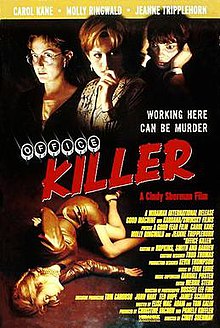Office Killer
| Office Killer | |
|---|---|
 Theatrical release poster | |
| Directed by | Cindy Sherman |
| Written by | Todd Haynes Tom Kalin Elise MacAdam Cindy Sherman |
| Produced by |
|
| Starring | Carol Kane David Thornton Molly Ringwald Jeanne Tripplehorn Barbara Sukowa |
| Cinematography | Russell Fine |
| Edited by | Merril Stern |
| Music by | Evan Lurie |
Production companies | |
| Distributed by | Strand Releasing (United States theatrical)[1] Miramax International (International theatrical and worldwide home video[2])[1] |
Release date |
|
Running time | 82 minutes |
| Country | United States |
| Language | English |
Office Killer is a 1997 American comedy-horror film directed by Cindy Sherman. It was released in the fall of 1997 and stars Carol Kane, Molly Ringwald and David Thornton.
Plot
[edit]A magazine editor named Dorine, due to budget cuts, is forced to work from home. One night she is called to help fix the computer of a co-worker, Gary Michaels, who is electrocuted while trying to fix the wires. Dorine dials 911, but hangs up when the call is answered. She places the corpse on a cart, rolls it down to her car, loads it in her trunk, and takes it home, placing it in her basement. Then, seemingly without reason, she goes into a murder spree.
She begins her spree by murdering another office worker, but later murders two young Girl Scouts who arrive at her door to sell cookies. The young girls join the other corpses in the basement, and Dorine is seen eating the cookies while working on her new laptop.
Dorine sends messages from Gary to the remaining office workers, implying he is alive. There are three more murders before the movie ends, all artistically executed. The last murder is the office manager (played by a young Jeanne Tripplehorn), who awakens in the basement, surrounded by dismembered bodies, after being knocked out by Dorine on a lunch date. After dispatching the office manager's boyfriend (a young Michael Imperioli) who had come searching for her with a kitchen knife, Dorine murders the office manager after taunting her for making her and other employees work from home.
The last scene shows Dorine, after her mother's death, setting fire to her basement, then, sporting a blond wig and makeup and with the office manager's head in a bag on the seat beside her, driving away in her car, and circling a newspaper ad for an office job.
Cast
[edit]- Carol Kane as Dorine Douglas
- Molly Ringwald as Kim Poole
- Jeanne Tripplehorn as Norah Reed
- Barbara Sukowa as Virginia Wingate
- Michael Imperioli as Daniel Birch
- David Thornton as Gary Michaels
- Alice Drummond as Carlotta Douglas
- Michelle Hurst as Kate
- Julia McIlvaine as Linda
- Timothy Stickney as Paramedic
- Eric Bogosian as Peter Douglas (uncredited)
Production
[edit]Office Killer was one in a planned series of low-budget horror movies by veteran indie producer Christine Vachon, with these films being intended to have budgets of around $300,000.[1]
Reception
[edit]The film received a mixed response from critics. On review aggregator website Rotten Tomatoes, the film holds a 17% rating, based on 18 reviews, with an average rating of 3.1/10.[3] Stephen Holden of The New York Times claimed in December 1997 that the film included "a nasty caricature of Arianna Stassinopoulos Huffington".[4] He added that the film was "sadly inept" and that "the actors try gamely to rise above their cardboard roles." Derek Elley of Variety criticized the film's tone in his 1997 review. He wrote, "in its early stages, the film aims for a kind of modern-baroque spoofery, with Dorine nagged at home by her crippled mom, the women in the office all at each other’s throats and Dorine herself toddling through the picture as the world’s most unlikely mass murderer. However, the script is so lusterless, the pacing so leaden and the psychology so poorly worked out, that the pic doesn’t even work as a black comedy. Later gore scenes just look silly."[1]
In 1999, Mike Emery of The Austin Chronicle also had a mixed review, writing "perhaps Sherman should have concentrated on the realistic terror of staff meetings, 'casual day', and the office lunch room. Instead, we get frequent images that are typical of most horror movies and not really worth revisiting."[5] AllMovie's Mark Deming gave it two and a half out of five stars, writing "where Wes Craven's Scream ridiculed slasher flick clichés in a way that appealed to hip, seen-it-all youngsters, Sherman's angle is more subversive as she seeks to uncover the serial killer lurking inside the meek, the dispirited, and the neglected amongst us. In that undertaking, she couldn't have gathered a better supporting cast."[6] The film was included in Magill's Cinema Annual 1998: A Survey of the Films of 1997, with the book stating that "Office Killer is engaging because it raises questions about human identity in a sly, comic fashion"[7]
References
[edit]- ^ a b c d Elley, Derek (20 August 1997). "Office Killer". Variety. Retrieved 22 November 2021.
- ^ "Strand nabs U.S. rights to 'Killer'". Variety. 18 August 1997. Retrieved 6 November 2022.
Strand was chosen to distribute "Office Killer" after a series of delicate negotiations between Miramax, which still owns international and ancillary rights to the arthouse-styled genre film, and Good Machine, Ted Hope's and James Schamus' Gotham-based indie, which produced the film through its Good Fear joint venture with Kardana Films.
- ^ "OFFICE KILLER". Rotten Tomatoes. Retrieved February 7, 2023.
- ^ "'Office Killer': Cindy Sherman Turns to Movies". partners.nytimes.com.
- ^ "Office Killer".
- ^ "Office Killer (1997) - Cindy Sherman | Synopsis, Movie Info, Moods, Themes and Related | AllMovie".
- ^ Fhaner, Beth A. (1998). Magill's Cinema Annual 1998: A Survey of the Films of 1997. Visible Ink Press. ISBN 9781578590568. Retrieved 11 February 2022.
